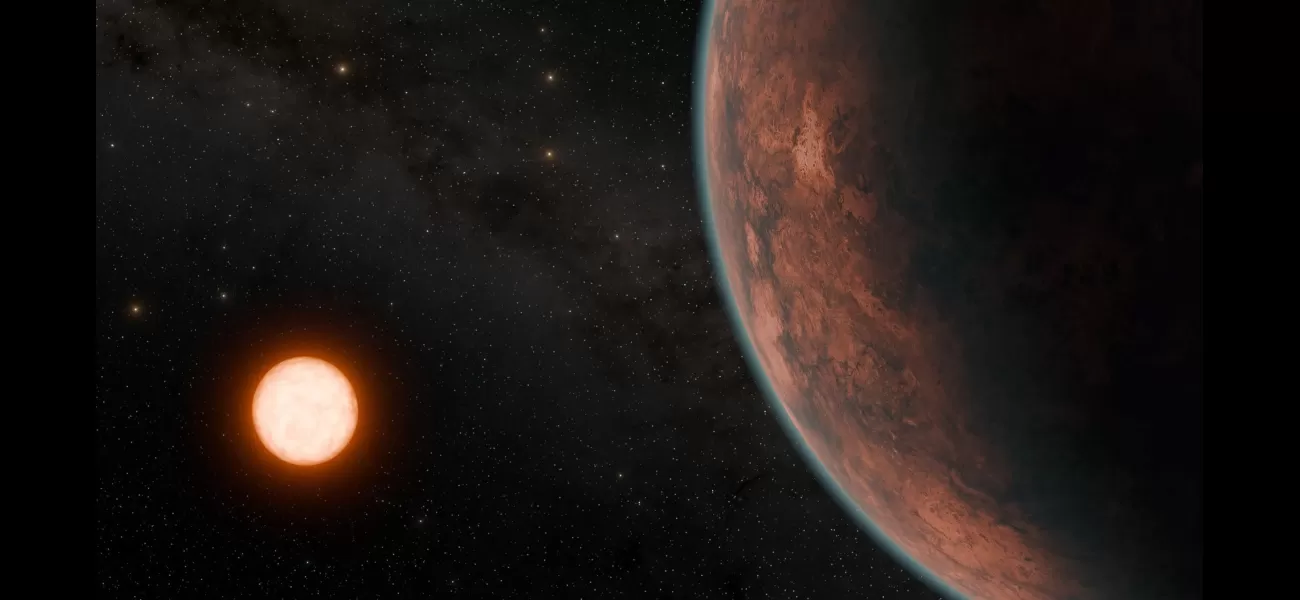Researchers find planet that may be able to support life.
Gliese 12b is a nearby exoplanet that orbits its star every 12.8 days, and is located just 40 light years away.
May 27th 2024.

Scientists from two different research teams have made an exciting discovery - a potentially habitable planet that is smaller than Earth but larger than Venus. This newly found exoplanet, called Gliese 12b, is orbiting a cool red dwarf star located about 40 light-years away, in the constellation Pisces. According to two studies published in The Astrophysical Journal Letters and Monthly Notices of the Royal Astronomical Society, Gliese 12b is approximately 27% the size of our sun and has a temperature that is 60% of our sun's.
Despite its smaller size, Gliese 12b still falls within what is known as the habitable zone - the perfect distance from its star to potentially have liquid water and sustain life. This is due to the fact that its star is much smaller than our sun, meaning the habitable zone is closer to the star. Interestingly, Gliese 12b completes its orbit around its star every 12.8 days.
Scientists have calculated that, assuming Gliese 12b does not have an atmosphere, its surface temperature would be around 42 degrees. "We've found the closest Earth-sized planet that we know of that transits its star and is potentially habitable," said Masayuki Kuzuhara, a project assistant professor at the Astrobiology Centre in Tokyo and co-leader of one of the research teams.
The discovery of Earth-sized planets that are potentially habitable is an important step in our search for extraterrestrial life. Scientists can now study these planets to see what elements make up their atmospheres and whether they have water, a crucial component for life to exist. "There's only a handful that we've found that are good candidates for that. And this is our nearest, so that's quite a major discovery," said Larissa Palethorpe, a doctoral student at the University of Edinburgh and University College London who co-led the other study.
To locate Gliese 12b, scientists utilized data collected by NASA's Transiting Exoplanet Survey Satellite (TESS), which monitors thousands of stars each month for changes in brightness that could indicate the presence of orbiting exoplanets. It is easier for astronomers to find exoplanets orbiting red dwarf stars because their small size causes a more significant dimming effect during each transit.
At the moment, scientists are unsure about the specific composition of Gliese 12b's atmosphere or whether it even has one. However, they do not expect to find water on the planet. "There could be no water, and then we know a runaway greenhouse effect has already happened on this planet, making it more similar to Venus," explained Palethorpe.
The next step for scientists is to conduct spectroscopy analysis using the James Webb Space Telescope. This method involves capturing light from the star that passes through the exoplanet's atmosphere, revealing the presence of certain molecules. In addition to learning more about Gliese 12b, this research could also help us understand our own planet better. "What this planet will teach us, in particular, is what happened for Earth to stay habitable but for Venus to not... It can tell us the habitability pathways that planets take as they develop," said Palethorpe.
Despite its potential to sustain human life and its relatively close proximity to our solar system, it is highly unlikely that we will be visiting Gliese 12b anytime soon. "It's not reachable, it's 12 parsecs away," Palethorpe said, adding that it would take approximately 225,000 years to reach the planet with our current technology.
But for those who are interested in staying updated on the latest breaking news, celebrity gossip, and sports updates, there is a new way to do so. You can now follow us on WhatsApp and receive all the updates without any comments or algorithms - your privacy is our top priority. Join our WhatsApp channel now and stay connected with us.
Despite its smaller size, Gliese 12b still falls within what is known as the habitable zone - the perfect distance from its star to potentially have liquid water and sustain life. This is due to the fact that its star is much smaller than our sun, meaning the habitable zone is closer to the star. Interestingly, Gliese 12b completes its orbit around its star every 12.8 days.
Scientists have calculated that, assuming Gliese 12b does not have an atmosphere, its surface temperature would be around 42 degrees. "We've found the closest Earth-sized planet that we know of that transits its star and is potentially habitable," said Masayuki Kuzuhara, a project assistant professor at the Astrobiology Centre in Tokyo and co-leader of one of the research teams.
The discovery of Earth-sized planets that are potentially habitable is an important step in our search for extraterrestrial life. Scientists can now study these planets to see what elements make up their atmospheres and whether they have water, a crucial component for life to exist. "There's only a handful that we've found that are good candidates for that. And this is our nearest, so that's quite a major discovery," said Larissa Palethorpe, a doctoral student at the University of Edinburgh and University College London who co-led the other study.
To locate Gliese 12b, scientists utilized data collected by NASA's Transiting Exoplanet Survey Satellite (TESS), which monitors thousands of stars each month for changes in brightness that could indicate the presence of orbiting exoplanets. It is easier for astronomers to find exoplanets orbiting red dwarf stars because their small size causes a more significant dimming effect during each transit.
At the moment, scientists are unsure about the specific composition of Gliese 12b's atmosphere or whether it even has one. However, they do not expect to find water on the planet. "There could be no water, and then we know a runaway greenhouse effect has already happened on this planet, making it more similar to Venus," explained Palethorpe.
The next step for scientists is to conduct spectroscopy analysis using the James Webb Space Telescope. This method involves capturing light from the star that passes through the exoplanet's atmosphere, revealing the presence of certain molecules. In addition to learning more about Gliese 12b, this research could also help us understand our own planet better. "What this planet will teach us, in particular, is what happened for Earth to stay habitable but for Venus to not... It can tell us the habitability pathways that planets take as they develop," said Palethorpe.
Despite its potential to sustain human life and its relatively close proximity to our solar system, it is highly unlikely that we will be visiting Gliese 12b anytime soon. "It's not reachable, it's 12 parsecs away," Palethorpe said, adding that it would take approximately 225,000 years to reach the planet with our current technology.
But for those who are interested in staying updated on the latest breaking news, celebrity gossip, and sports updates, there is a new way to do so. You can now follow us on WhatsApp and receive all the updates without any comments or algorithms - your privacy is our top priority. Join our WhatsApp channel now and stay connected with us.
[This article has been trending online recently and has been generated with AI. Your feed is customized.]
[Generative AI is experimental.]
0
0
Submit Comment





